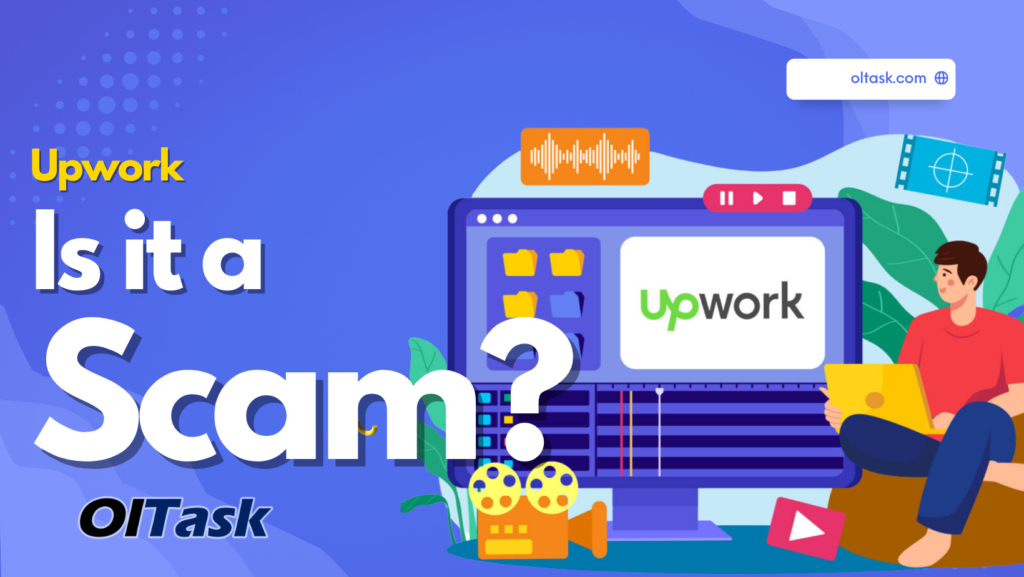Is Upwork Legit Or Scam? 6 Factors To Consider To Avoid Being Scammed

Are you considering diving into the world of freelancing through platforms like Upwork? The allure of working from home, choosing your projects, and setting your hours is undeniable. However, with the promise of freedom comes the risk of scams. Is Upwork legit? In this article, we will delve into the complexities of Upwork, exploring its legitimacy and shedding light on vital factors to ensure you’re not taken for a ride.
The Rise of Freelancing: Why Upwork Matters

Freelancing has undergone a significant transformation in recent years. With the rise of the gig economy, more individuals are embracing the flexibility and autonomy that comes with freelancing. Upwork, one of the most prominent platforms in this realm, has played a pivotal role in shaping this landscape.
The freelancing landscape has grown exponentially, with over 57 million freelancers in the United States alone, contributing an estimated $1.4 trillion to the economy. Upwork, founded in 2015, has become a leading player in the freelance marketplace. It boasts more than 18 million freelancers and over 5 million clients, facilitating billions of dollars in transactions each year.
Upwork’s allure is clear. It allows freelancers to work from anywhere, on their terms, and provides clients access to a diverse pool of talent. However, with such immense growth comes the inevitable question: Is Upwork legit?
Unveiling the Legitimacy of Upwork: Is Upwork Legit?
Upwork’s legitimacy starts with its business model. It acts as an intermediary, connecting freelancers with clients seeking various services. Clients post their job listings, and freelancers bid on these projects. Once a project is completed, Upwork ensures secure payment processing. It’s a transparent and straightforward system.
Upwork’s revenue model is mainly driven by service fees. It charges freelancers a fee based on their lifetime billings with a client, starting at 20% and decreasing as the lifetime billings with that client increase. Clients, on the other hand, pay a 3% processing fee for each transaction. This dual-fee structure not only ensures Upwork’s profitability but also adds a layer of security for both freelancers and clients.
Upwork’s Measures Against Scams

Upwork is acutely aware of the potential for scams and fraudulent activities on its platform and has implemented a comprehensive set of security measures to protect the interests of both freelancers and clients. These measures are designed to create a safe and trustworthy environment for all users.
1. Identity Verification
Upwork has introduced a stringent identity verification process that freelancers are required to complete as part of their registration. This process involves the submission of government-issued identification documents. The primary purpose of this step is to establish the legitimacy of freelancers and ensure that they are who they claim to be.
- Freelancers are asked to provide identification documents such as passports, driver’s licenses, or national ID cards.
- Upwork’s verification team reviews and cross-references the provided information with public databases to confirm the freelancer’s identity.
- This process helps weed out fraudulent or duplicate accounts and instills confidence in clients that they are dealing with genuine professionals.
2. Escrow Payment System
Upwork’s use of an escrow payment system is a fundamental component of ensuring the financial security of both clients and freelancers. This system creates a secure framework for financial transactions, minimizing the risk of non-payment or disputes over the quality of work.
- When a client and freelancer agree to work together, the client is required to deposit the agreed-upon funds into escrow.
- These funds are held securely by Upwork until the freelancer successfully completes the project.
- The funds are then released to the freelancer, thus ensuring that they are compensated for their work, and the client receives the agreed-upon services.
3. Dispute Resolution Process
In the event that conflicts or disputes arise between clients and freelancers, Upwork has established a well-defined dispute resolution process. This process is designed to mediate and arbitrate disagreements, providing a fair and impartial method of resolving issues.
- Upwork’s dispute resolution process begins when either the client or freelancer raises a formal dispute regarding a project.
- The platform’s dedicated team investigates the issue, reviewing the terms of the contract, communication, and any supporting documentation.
- The team then acts as a neutral third party, facilitating communication and working to find a fair resolution for both parties.
- In cases where an agreement cannot be reached, Upwork may offer binding arbitration, ensuring that disputes do not linger unresolved.
Positive User Feedback
One way to gauge Upwork’s legitimacy is through user feedback. Positive reviews and testimonials from freelancers and clients provide insight into the platform’s credibility. A quick search for Upwork reviews reveals a mix of opinions, which is typical of any large platform.
However, the presence of numerous freelancers who have successfully built careers on Upwork and clients who have consistently found quality service providers is a testament to the platform’s legitimacy. Positive feedback highlights that while risks exist, they can be mitigated with the right approach.
Legal Compliance
Upwork’s legitimacy extends to its adherence to local and international laws. The platform complies with taxation regulations and intellectual property laws, ensuring that freelancers and clients operate within the legal framework.
Upwork’s commitment to legal compliance is evident in its tax form submission requirements. It mandates freelancers to complete W-9 or W-8BEN forms, depending on their tax status. This not only ensures that freelancers report their earnings accurately but also helps the platform comply with taxation regulations.
Factors to Consider to Avoid Scams on Upwork

Now that we’ve established Upwork’s legitimacy as a platform, let’s delve into the key factors to consider to protect yourself from potential scams and challenges while navigating the freelancing marketplace.
1. Profile and Portfolio Evaluation
When you’re navigating the dynamic world of freelancing on Upwork, one of the most critical steps for both clients and freelancers is the thorough assessment of profiles and portfolios. This meticulous evaluation is essential to ensure that you’re making informed decisions and setting the stage for a successful working relationship.
For Freelancers
- Professional Profile: Freelancers should create and maintain a professional, well-detailed profile. This serves as your digital business card, and it’s the first impression you make on potential clients.
- Showcase Skills: Emphasize your skills, qualifications, and experiences prominently. Highlight the specific services you offer and your areas of expertise.
- Portfolio Highlights: Your portfolio should be a visual representation of your past work. Include samples that illustrate your capabilities and the quality of your work.
- Client Feedback: Display client reviews and ratings to build trust. Positive feedback from previous clients can be a powerful selling point.
For Clients
- Clear Job Descriptions: When posting a job, provide a clear and detailed job description. Explain the project’s scope, objectives, and any specific requirements you have.
- Expectation Setting: Clearly define your expectations regarding deliverables, timelines, and communication. This helps potential freelancers understand the project’s scope.
- Budget Clarity: Specify your budget range for the project. Being transparent about compensation avoids misunderstandings later on.
2. Communication is Key
In the intricate world of freelancing on Upwork, effective communication stands as one of the cornerstones of a successful working relationship. Regardless of whether you’re a client seeking services or a freelancer offering your expertise, the way you communicate can profoundly impact the outcome of your projects.
For Clients
- Detailed Project Requirements: Clearly and comprehensively outline the project’s requirements. Provide all the necessary information, including objectives, specifications, and any specific preferences you have.
- Timelines: Establish realistic project timelines and deadlines. Ensure that your expectations regarding project completion are well-understood by the freelancer.
- Expectations: Set clear expectations about what you anticipate as the end result. This includes the quality of work, deliverables, and any unique criteria for success.
For Freelancers
- Question and Clarify: Don’t hesitate to ask questions and seek clarifications. If any aspect of the project isn’t clear or if you need further information, seek it promptly.
- Regular Updates: Keep your clients informed about the project’s progress. Regular updates on milestones, challenges, or any deviations from the initial plan are crucial.
- Timely Responses: Respond to client inquiries promptly. Timely communication shows your commitment and professionalism.
3. Use Upwork’s Payment System
One of the fundamental safeguards for freelancers and clients on Upwork is the use of the platform’s payment system. This system is not just a convenience; it’s a crucial element that guarantees financial security and peace of mind for all parties involved.
- Escrow Protection: Upwork’s payment system operates on an escrow basis. When a client and freelancer agree to work together, the client is required to deposit the agreed-upon funds into escrow. This essentially means that the money is held securely by Upwork until the freelancer successfully completes the project.
- Release Upon Completion: The funds held in escrow are only released to the freelancer once the project is satisfactorily completed, as agreed upon by both parties. This process ensures that freelancers are compensated for their work, and clients receive the services they’ve paid for.
- Minimizes Non-Payment Risks: The use of Upwork’s payment system significantly reduces the risk of non-payment for freelancers. It creates a tangible incentive for clients to release funds, as they have full control over when the payment is made. This protection extends to freelancers’ peace of mind, knowing they won’t be left unpaid for their hard work.
- Quality Assurance: Clients also benefit from this system by having the assurance that their funds are safeguarded until they receive the agreed-upon deliverables. If the freelancer doesn’t meet the project’s requirements, the client retains the ability to dispute the payment.
- Transparent Transactions: The use of Upwork’s payment system ensures transparent financial transactions, enhancing trust and accountability between clients and freelancers. All payment records are stored on the platform, making it easy to track and verify financial transactions.
4. Be Wary of Red Flags
While Upwork is generally a secure platform, it’s still crucial to be vigilant and aware of potential red flags. Recognizing these warning signs can help you avoid undesirable or even fraudulent situations, protecting both freelancers and clients.
- Request for Free Work: If you encounter a client who insists on receiving free work or requests unpaid samples as part of the hiring process, be cautious. This could be a sign that the client is not serious about the project or intends to take advantage of free labor.
- External Communication: Communicating solely through external channels, such as email or messaging apps, rather than utilizing Upwork’s messaging system, can be a red flag. It could indicate an attempt to bypass the platform’s protections or create a less traceable communication trail.
- Unusually High Payment Offers: While competitive compensation is enticing, be cautious of clients who make extraordinarily high payment offers. If an offer seems too good to be true, it’s wise to scrutinize the client’s intentions. Verify the project’s scope and expectations to ensure it aligns with the offer.
- Freelancers Avoiding Upwork’s Payment System: For clients, if freelancers attempt to steer transactions away from Upwork’s payment system and request payment through other means, it’s a red flag. This could be an attempt to avoid fees or to conduct untraceable transactions.
- Request for Sensitive Personal Information: Clients should be wary if freelancers request sensitive personal information, such as social security numbers, bank account details, or any information that seems unrelated to the project’s requirements. Genuine projects typically don’t require such information.
- Inconsistent or Vague Project Details: Both clients and freelancers should be cautious if the project details provided are inconsistent, vague, or unclear. This can lead to misunderstandings and disputes down the line. A well-defined project scope is essential for a successful working relationship.
- Unusual Payment Requests: Freelancers should be cautious if clients request payment upfront before any work is done. While some projects may require a deposit, this should be a reasonable and standard practice.
- Trust Your Instincts: If something about a potential client or freelancer doesn’t sit right with you, trust your instincts. Your gut feeling can be a powerful tool in avoiding problematic situations.
5. Leverage Upwork’s Mediation
In case of disputes, don’t hesitate to utilize Upwork’s mediation and dispute resolution services. This impartial third-party can help settle disagreements and ensure fair outcomes for both parties.
6. Maintain Data Security
Both freelancers and clients should prioritize data security. Sharing sensitive information should be done within Upwork’s secure messaging system. Avoid sharing personal or financial details through external communication channels.
By considering these factors and remaining vigilant, you can significantly reduce the risk of encountering scams on Upwork. While the platform has robust security measures in place, your proactive approach is essential in ensuring a safe and productive freelancing experience.
Upwork Legitimacy: Navigating Success with Confidence

While the question “Is Upwork legit?” is valid, the platform’s legitimacy is well-established. Upwork is a legitimate and widely recognized freelancing marketplace that connects millions of freelancers with clients worldwide. Your success on Upwork ultimately depends on your ability to navigate the platform wisely, harness its opportunities, and mitigate its risks.
Ready to harness Upwork’s full potential of your freelancing career with OlTask’s expert services in virtual assistance? Start your journey today paving the way to your freelancing success.